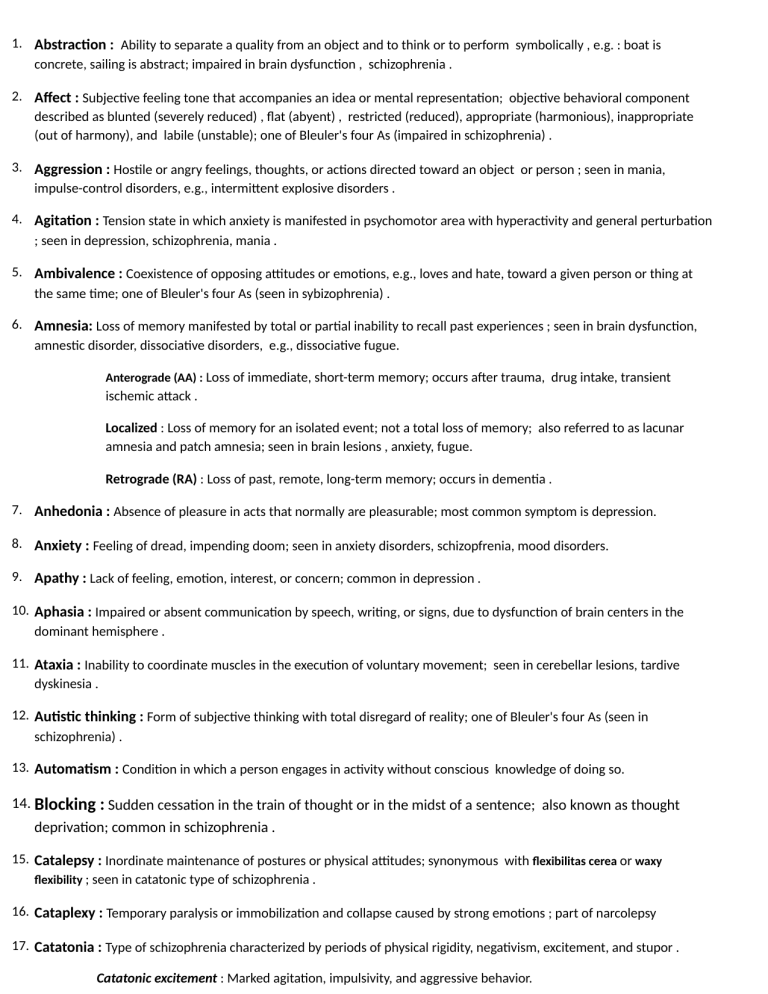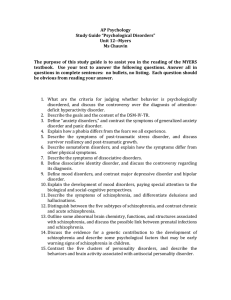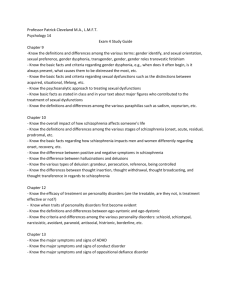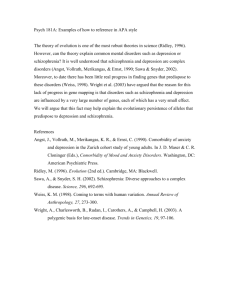
1. Abstraction : Ability to separate a quality from an object and to think or to perform symbolically , e.g. : boat is concrete, sailing is abstract; impaired in brain dysfunction , schizophrenia . 2. Affect : Subjective feeling tone that accompanies an idea or mental representation; objective behavioral component described as blunted (severely reduced) , flat (abyent) , restricted (reduced), appropriate (harmonious), inappropriate (out of harmony), and labile (unstable); one of Bleuler's four As (impaired in schizophrenia) . 3. Aggression : Hostile or angry feelings, thoughts, or actions directed toward an object or person ; seen in mania, impulse-control disorders, e.g., intermittent explosive disorders . 4. Agitation : Tension state in which anxiety is manifested in psychomotor area with hyperactivity and general perturbation ; seen in depression, schizophrenia, mania . 5. Ambivalence : Coexistence of opposing attitudes or emotions, e.g., loves and hate, toward a given person or thing at the same time; one of Bleuler's four As (seen in sybizophrenia) . 6. Amnesia: Loss of memory manifested by total or partial inability to recall past experiences ; seen in brain dysfunction, amnestic disorder, dissociative disorders, e.g., dissociative fugue. Anterograde (AA) : Loss of immediate, short-term memory; occurs after trauma, drug intake, transient ischemic attack . Localized : Loss of memory for an isolated event; not a total loss of memory; also referred to as lacunar amnesia and patch amnesia; seen in brain lesions , anxiety, fugue. Retrograde (RA) : Loss of past, remote, long-term memory; occurs in dementia . 7. Anhedonia : Absence of pleasure in acts that normally are pleasurable; most common symptom is depression. 8. Anxiety : Feeling of dread, impending doom; seen in anxiety disorders, schizopfrenia, mood disorders. 9. Apathy : Lack of feeling, emotion, interest, or concern; common in depression . 10. Aphasia : Impaired or absent communication by speech, writing, or signs, due to dysfunction of brain centers in the dominant hemisphere . 11. Ataxia : Inability to coordinate muscles in the execution of voluntary movement; seen in cerebellar lesions, tardive dyskinesia . 12. Autistic thinking : Form of subjective thinking with total disregard of reality; one of Bleuler's four As (seen in schizophrenia) . 13. Automatism : Condition in which a person engages in activity without conscious knowledge of doing so. 14. Blocking : Sudden cessation in the train of thought or in the midst of a sentence; also known as thought deprivation; common in schizophrenia . 15. Catalepsy : Inordinate maintenance of postures or physical attitudes; synonymous with flexibilitas cerea or waxy flexibility ; seen in catatonic type of schizophrenia . 16. Cataplexy : Temporary paralysis or immobilization and collapse caused by strong emotions ; part of narcolepsy 17. Catatonia : Type of schizophrenia characterized by periods of physical rigidity, negativism, excitement, and stupor . Catatonic excitement : Marked agitation, impulsivity, and aggressive behavior. Catatonic rigidity : Rigidy posturing and stereotypical behavior. 18. Circumstantiality : Thought and speech associated with unnecessary detail that is usually relevant to a question and that ultimately leads to an answer; seen in schizo-phrenia, obsessive-compulsive disorder . 19. Clang association : Association, i.e., relationship, based on similarity of sound , without regard for differences in meaning; common in mania . 20. Clouding of consciousness : Impairment of orientation, perception, and attention; seen in brain dysfunctions. 21. Cognition : Quality of knowing, including perceiving, recognizing, judging, sensing , reasoning, and imagining; impaired in brain dysfunction, mental retardation, cognitive disorders . 22. Coma : Most profound degree of stupor in which all consciousness is lost and all voluntary activity ceases; organically based . 23. Compulsion : Irresistible impulse to perform an irrational act; seen in impulse-control and obsessive-compulsive disorders . 24. Confabulation : Fabrication of stories in response to questions about situations or events that are not recalled. 25. Conflict : Mental struggle that arises from simultaneous operation of opposing impulses, drives, or external (environmental) or internal demands; called intrapsychic when conflict is between forces within the personality, extrapsychic when conflict is between the self and the environment . 26. Confusional state : Disturbed orientation with respect to time, place, or person . 27. Consciousness : Awareness of one's own internal thoughts and feelings and ability to recognize external environment; impaired in brain dysfunction, delirium, and dissociative fugue and other dissociative states . 28. Coprolalia : Involuntary utterance of vulgar or obscene words; seen in Tourette' s disorder. 29. Déjå entendu : Feeling that one is hearing or perceiving what one has heard before; seen in anxiety disorders, fatigue. 30. Déjå vu : Feeling that one is seeing or experiencing what one has seen before; seen in anxiety disorders, fatigue . 31. Delusion : False belief, i.e., one not shared by others, that is firmly maintained, even though contradicted by social reality; most common in schizophrenia . Grandiose delusion : Belief that one is possessed of greatness , megalomania , such ideas are refered to as delusions of grandeur ; seen in schizophrenia, mania. tertiary syphilis; a variation is that someone of high social is deeply in love with the person , usually a woman—also called erotomuniu, Clérembault’s syndrome and delusional loving . Induced delusion : Hallucination aroused in one person by another; also called folie a deux . Infidelity delusion : False belief that a loved one is unfaithful, e.g., amorous paranoia . Persecutory (paranoid) delusion : Excessive or irrational suspiciousness and distrustfulness of others, characterized by systematized delusions of persecution; seen in paranoid schizophrenia . Somatic delusion : Belief that patient's body or parts of the body are diseased or distorted . 32. Depersonalization : Feeling of having lost one's personal identity and of being different, strange, or unreal ; part of dissociative disorders . 33. Depression : Feeling tone characterized by sadness, apathy, pessimism, and a sense of loneliness ; part of major depressive and other mood disorders . 34. Derealization : Feeling of changed reality ; environment is strange or unreal; common in anxiety and dissociative disorders . 35. Dereism : Mental activity not in accordance with reality, logic , or experience . 36. Disorientation : Loss of awareness of position of self in relation to space,time, or other persons; confusion . 37. Disytractibility : Condition in which the patient changes from topic to topic in accor- dance with stimuli from within and from without; seen in mania . 38. Dysarthria : Difficulty in speech production due to incoordination of speech apparatus . 39. Dyskinesia : Any disturbance of movement . 40. Echolalia : Imitative repetition of speech of another ; seen in schizophrenia . 41. Echopraxia: Imitative repetition of movements of another; sometimes seen in catatonic schizophrenia . 42. Ecstasy : State of elation beyond reason and control ; trance state of overwhelming emotion, e.g., religious fervor . 43. Elation : Affect consisting of feelings of euphoria, triumph, intense self-satisfaction, or optimism . 44. Euphoria : Exaggerated feeling of physical or emotional well-being, usually of psychological origin; seen in brain dysfunctions, drug-induced and other states . 45. Exaltation : Excessively intensified sense of well-being ; seen in mania. 46. Fear : Unpleasant emotional and physiological response to recognized sources of danger (to be distinguished from anxiety) . 47. Flight of ideas : Rapid shifting from one topic to another ; also called topical flight; themes can sometimes be followed ; part of manic episode. 48. Grandiosity : Feelings of great importance; absurd exaggeration ; seen in mania, schizophrenia 49. Hallucination : Sensory perception for which there is no external stimulus; seen in schizophrenia, toxic psychoses. - Auditory hallucination : Associated with sound; most common in Schizophrenia - Gustatory hallucination : Associated with taste. - Haptic hallucination : Associated with sensation of touch; common in DTs , cocainism - Hypnagogic hallucination : Occurs upon awakening. - Lilliputian hallucination : Hallucinated object appears reduced in size; also called microptic hallucination; seen in toxic psychoses . - Visual hallucination : Associated with sight . 50. Hypermnesia : Exaggerated memory ; ability to recall material not ordinarily available to memory process . 51. Hypochondriasis : Somatic overconcern with and morbid attention to details of body Functioning ; exaggeration of any symptom . 52. Ideas of reference : Incorrect interpretation of casual incidents and external events as directly referring to oneself ; may become intense enough to constitute delusions . 53. Ideas of unreality : Thoughts that events are artificial, illusory, unpredictable, or do not exist ; seen in schizophrenia, anxiety disorders, dissociative disorders . 54. Ideé fixe : Fixed idea ; describes a compulsive drive, an obsessive idea, or a delusion . 55. Illusion : Erroneous perception ; false response to a sensory stimulus; seen in schizo- phrenia, toxic psychoses. 56. Incoherence : Quality or state of being loose ; lacking cohesion. 57. Insight : Knowledge of objective reality of a situation; person is aware of a mental problem . 58. Intelligence quotient (I.Q.) : Numerical rating determined through psychological testing that indicates approximate relationship of person's mental age (MA) to chronological age (CA); expressed mathematically as I.Q. = (MA/CA) X 100. 59. Intoxication : State due to recent ingestion or presence in the body of a chemical agent , causing maladaptive behavior because of its effects on the central nervous system . 60. Judgment : Ability to recognize true relation of ideas ; capacity to draw correct conclusions from experience; impaired in schizophrenia, brain dysfunction . 61. La belle indifférence : Literally means beautiful indifference ; condition of certain patients with conversion disorders who show an inappropriate lack of concern about their disabilities . 62. Logorrhea : Uncontrollable, excessive talking ; seen in mania, schizophrenia . 63. Loosening of associations : Various disturbances of associations that render speech 64. (and thought ) inexact , vague, diffuse, unfocused ; one of Bleuler's four As (seen in schizophrenia). 65. Macropsia : False perception that objects are larger than they really are; seen in drug intoxication . 66. Magical thinking : Conviction that thinking equates with doing; characterized by lack of realistic relation between cause and effect ; occurs in dreams, children, primitive peoples, and patients under a variety of conditions; seen in obsessive compulsive disorder . 67. Mannerism : Gesture or other form of expression peculiar to a given person; seen in schizophrenia. Memory : Ability, process, or act of remembering or recalling; ability to reproduce what has been learned or experienced . Immediate (short-term) memory : Refers to immediate retention, i.e.. events of the past few moments ; also known as working memory and buffer memory . Recent memory : Refers to events over past few days . Remote (long-term) memory : Refers to events in distant past . Mood : Feeling tone, particularly as experienced internally by a person . Mood-congruent : In harmony; mood-appropriate; ideas consistent with mood; common in bipolar disorder. Mood-incongruent : Mood-inappropriate; ideas out of harmony with mood ; common in schizophrenia. 68. 69. Mutism : Inability to speak ; common in catatonic schizophrenia, fugue states . 70. Negativism : Opposition of resistance , either covert or overt , to outside suggestions Or advice; may be seen in schizophrenia . 71. Neologism : New word created by patient, which is often a blend of other words; seen in schizophrenia . 72. Nihilism : Feelings of nonexistence and hopelessness ; may assume delusional proportions ; common in depression. 73. Obsession : Idea, emotion, or impulse that repetitively and insistently forces itself into consciousness, although it is unwelcome; part of obsessive-compulsive disorder. 74. Orientation : Awareness of one's self in relation to time, place, or person ; lost in brain dysfunction, delirium. 75. Panic : Sudden, overwhelming anxiety of such intensity that it produces terror and physiological changes . 76. Paucity of speech : Limited use of speech; seen in autistic disorder, catatonic schizophrenia, major depressive disorder . 77. Perseveration : Involuntary, excessive continuation or recurrence of a response or activity, most often verbal; seen in schizophrenia, e.g., perseverative speech . 78. Phobia : A morbid fear associated with extreme anxiety; part of specific and social phobias and agoraphobia. 79. Psychomotor retardation : Slowed psychic activity, motor activity, or both; seen in depression, catatonic schizophrenia. Opposite can also occur, i.e., psychomotor agitation . 80. Stereotypy : Constant, almost mechanical, repetition of any action; common in schizophrenia. 81. Stilted speech : Formal, stiff speech pattern . 82. Stupor : State in which a person does not react to or is unaware of the surroundings . 83. (in catatonic schizophrenic stupor the unawareness is more apparent than real ); due to neurological or psychiatric disorders . 84. Thought broadcasting : Delusion about thoughts being aired to the outside world; one of Schneider's first rank symptoms (seen in schizophrenia). 85. Thought disorder : Disturbance of speech, communication, or content of thought, e•g., delusions, ideas of reference, poverty of thought, flight of ideas, perseveration, loosening of associations; can be caused by a functional mental disorder or a medical condition; characteristic of schizophrenia . 86. Thought insertion : Delusion that thoughts are placed into the mind by outside influences. One of Schneider's first rank symptoms (seen in schizophrenia). 87. Tic : Sudden involuntary muscle movement ; seen in tic disorders . 88. Verbigeration : Stereotypy of seemingly meaningless repetition of words or sentences . 89. Word salad : Mixture of words and phrases that lack comprehensive meaning or logical coherence; commonly seen in schizophrenic states-



